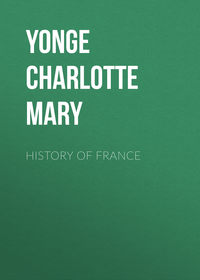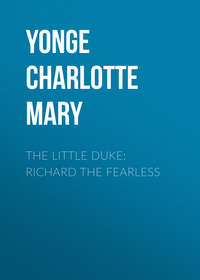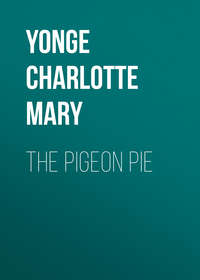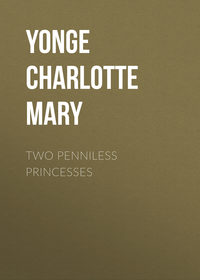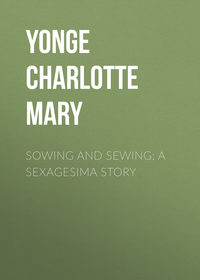
Chantry House
And though Martyn was gone back to school, the child felt the wrench from home most severely. As she told me on one of those sorrowful days, ‘She did think she had come back to live at dear, dear little Hillside all the days of her life.’ Poor child, we became convinced that this vehement attachment to Griffith’s brothers was one factor in Mrs. Fordyce’s desire to make a change that should break off these habits of intimacy and dependence.
Pluralities had not become illegal, and Frank Fordyce, being still the chief landholder in Hillside, and wishing to keep up his connection with his people, did not resign the rectory, though he put the curate into the house, and let the farm. Once or twice a year he came to fulfil some of a landlord’s duties, and was as genial and affectionate as ever, but more and more absorbed in the needs of Beachharbour, and unconsciously showing his own growth in devotion and activity; while he brought his splendid health and vigour, his talent, his wealth, and, above all, his winning charm of manner and address, to that magnificent work at Beachharbour, well known to all of you; though, perhaps, you never guessed that the foundation of all those churches and their grand dependent works of piety, mercy, and beneficence was laid in one young girl’s grave. I never heard of a fresh achievement there without remembering how the funeral psalm ends with—
‘Prosper Thou the work of our hands upon us,O prosper Thou our handiwork.’And Emily? Her drooping after the loss of her friend was sad, but it would have been sadder but for the spirit Ellen had infused. We found the herbs to heal our woe round our pathway, though the first joyousness of life had departed. The reports Mr. Henderson and the Hillside curate brought from Oxford were great excitements to us, and we thought and puzzled over church doctrine, and tried to impart it to our scholars. We I say, for Henderson had made me take a lads’ class, which has been the chief interest of my life. Even the roughest were good to their helpless teacher, and some men, as gray-headed as myself, still come every Sunday to read with Mr. Edward, and are among the most faithful friends of my life.
CHAPTER XXXV
GRIFF’S BIRD
‘Shall such mean little creatures pretend to the fashion?Cousin Turkey Cock, well may you be in a passion.’The Peacock at Home.It was not till the second Christmas after dear Ellen Fordyce’s death that my eldest brother brought his wife and child to Chantry House, after an urgent letter to Lady Peacock from my mother, who yearned for a sight of Griffith’s boy.
I do not wish to dwell on that visit. Selina, or Griff’s bird, as Martyn chose to term her, was certainly handsome and stylish; but her complexion had lost freshness and delicacy, and the ladies said her colour was rouge, and her fine figure due to other female mysteries. She meant to be very gracious, and patronised everybody, especially Emily, who, she said, would be quite striking if not sacrificed by her dress, and whom she much wished to take to London, engaging to provide her with a husband before the season was over, not for a moment believing my mother’s assurance that it would be a trial to us all whenever we had to resign our Emily. Nay, she tried to condole with the poor moped family slave, and was received with such hot indignation as made her laugh, for, to do her justice, she was good-natured and easy-tempered. However, I saw less of her than did the others, for I believe she thought the sight of me made her ill. Griff, poor old fellow, was heartily glad to be with us again, but quite under her dominion. He had lost his glow of youth and grace of figure, his complexion had reddened, and no one would have guessed him only a year older than Clarence, whose shoulders did indeed reveal something of the desk, but whose features, though pale, were still fair and youthful. The boy was another Clarence, not so much in compliment to his godfather as because it was the most elegant name in the family, and favoured an interesting belief, current among his mother’s friends, that the king had actually stood sponsor to the uncle. Poor little man, his grandmother shut herself into the bookroom and cried, after her first sight of him. He was a wretched, pinched morsel of humanity, though mamma and Emily detected wonderful resemblances; I never saw them, but then he inherited his mother’s repulsion towards me, and roared doubly at the sight of me. My mother held that he was the victim of Selina’s dissipations and mismanagement of herself and him, and gave many matronly groans at his treatment by the smart, flighty nurse, who waged one continual warfare with the household.
Accustomed to absolute supremacy in domestic matters, it was very hard for my mother to have her counsels and experience set at naught, and, if she appealed to Griff, to find her notions treated with the polite deference he might have shown to a cottage dame.
A course of dinner-parties could not hinder her ladyship from finding Chantry House insufferably dull, ‘always like Sunday;’ and, when she found that we were given to Saints’ Day services, her pity and astonishment knew no bounds. ‘It was all very well for a poor object like Edward,’ she held, ‘but as to Mr. Winslow and Clarence, did they go for the sake of example? Though, to be sure, Clarence might be a Papist any day.’
Popery, instead of Methodism, was just beginning to be the bugbear set up for those whom the world held to be ultra-religious, and my mother was so far disturbed at our interest in what was termed Oxford theology that the warning would have alarmed her if it had come from any other quarter. However, Lady Peacock was rather fond of Clarence, and entertained him with schemes for improving Chantry House when it should have descended to Griffith. The mullion rooms were her special aversion, and were all to be swept away, together with the vaultings and the ruin—‘enough to give one the blues, if there were nothing else,’ she averred.
We really felt it to the credit of our country that Sir George Eastwood sent an invitation to an early dance to please his young daughters; and for this our visitors prolonged their stay. My mother made Clarence go, that she might have some one to take care of her and Emily, since Griff was sure to be absorbed by his lady. Emily had not been to a ball since those gay days in London with Ellen. She shrank back from the contrast, and would have begged off; but she was told that she must submit; and though she said she felt immeasurably older than at that happy time, I believe she was not above being pleased with the pale pink satin dress and wreath of white jessamine, which my father presented to her, and in which, according to Martyn, she beat ‘Griff’s bird all to shivers.’
Clarence had grown much less bashful and embarrassed since the Tooke affair had given him a kind of position and a sense of not being a general disgrace. He really was younger in some ways at five-and-twenty than at eighteen; he enjoyed dancing, and especially enjoyed the compliments upon our sister, whom in our usual fashion we viewed as the belle of the ball. He was standing by my fire, telling me the various humours of the night, when a succession of shrieks ran through the house. He dashed away to see what was the matter, and returned, in a few seconds, saying that Selina had seen some one in the garden, and neither she nor mamma would be satisfied without examination—‘though, of course, I know what it must be,’ he added, as he drew on his coat.
‘Bill, are you coming?’ said Griff at the door. ‘You needn’t, if you don’t like it. I bet it is your old friend.’
‘I’m coming! I’m coming! I’m sure it is,’ shouted Martyn from behind, with the inconsistent addition, ‘I’ve got my gun.’
‘Enough to dispose of any amount of robbers or phantoms either,’ observed Griff as they went forth by the back door, reinforced by Amos Bell with a lantern in one hand and a poker in the other.
My father was fortunately still asleep, and my mother came down to see whether I was frightened.
She said she had no patience with Selina, and had left her to Emily and her maid; but, before many words had been spoken, they all came creeping down after her, feeling safety in numbers, or perhaps in her entire fearlessness. The report of a gun gave us all a shock, and elicited another scream or two. My mother, hoping that no one was hurt, hastened into the hall, but only to meet Griff, hurrying in laughing to reassure us with the tidings that it was only Martyn, who had shot the old sun-dial by way of a robber; and he was presently followed by the others, Martyn rather crestfallen, but arguing with all his might that the sun-dial was exactly like a man; and my mother hurried every one off upstairs without further discussion.
Clarence was rather white, and when Martyn demanded, ‘Do you really think it was the ghost? Fancy her selection of the bird!’ he gravely answered, ‘Martyn, boy, if it were, it is not a thing to speak of in that tone. You had better go to bed.’
Martyn went off, somewhat awed. Clarence was cold and shivering, and stood warming himself. He was going to wind up his watch, but his hand shook, and I did it for him, noting the hour—twenty minutes past one.
It appeared that Selina, on going upstairs, recollected that she had left her purse in Griff’s sitting-room before going to dress, and had gone in quest of it. She heard strange shouts and screams outside, and, going to one of the old windows, where the shutters were less unmanageable than elsewhere, she beheld a woman rushing towards the house pursued by at least a couple of men. Filled with terror she had called out, and nearly fainted in Griff’s arms.
‘It agrees with all we have heard before,’ said Clarence, ‘the very day and hour!’
‘As Martyn said, the person is strange.’
‘Villagers, less concerned, have seen the like,’ he said; ‘and, indeed, all unconsciously poor Selina has cut away the hope of redress,’ he sighed. ‘Poor, restless spirit! would that I could do anything for her.’
‘Let me ask, do you ever see her now?’
‘N-no, I suppose not; but whenever I am anxious or worried, the trouble takes her form in my dreams.’
Lady Peacock had soon extracted the ghost story from her husband, and, though she professed to be above the vulgar folly of belief in it, her nerves were so upset, she said, that nothing would have induced her to sleep another night in the house. The rational theory on this occasion was that one of the maids must have stolen out to join in the Christmas entertainment at the Winslow Arms, and been pursued home by some tipsy revellers; but this explanation was not productive of goodwill between the mother and daughter-in-law, since mamma had from the first so entirely suspected Selina’s smart nurse as actually to have gone straight to the nursery on the plea of seeing whether the baby had been frightened. The woman was found asleep—apparently so—said my mother, but all her clothes were in an untidy heap on the floor, which to my mother was proof conclusive that she had slipped into the house in the confusion, and settled herself there. Had not my mother with her own eyes watched from the window her flirtations with the gardener, and was more evidence requisite to convict her? Mamma entertained the hope that her proposal would be adopted of herself taking charge of her grandson, and fattening his poor little cheeks on our cows’ milk, while the rest of the party continued their round of visits.
Lady Peacock, however, treated it as a personal imputation that her nurse should be accused instead of any servant of Mrs. Winslow’s own, though, as Griff observed, not only character, but years and features might alike acquit them of any such doings; but even he could not laugh long, for it was no small vexation to him that such offence should have arisen between his mother and wife. Of course there was no open quarrel—my mother had far too much dignity to allow it to come to that—but each said in private bitter things of the other, and my lady’s manner of declining to leave her baby at Chantry House was almost offensive.
Poor Griffith, who had been growing more like himself every day, tried in vain to smooth matters, and would have been very glad to leave his child to my mother’s management, though, of course, he acquitted the nurse of the midnight adventure. He privately owned to us that he had no opinion of the woman, but he defended her to my mother, in whose eyes this was tantamount to accusing her own respectable maids, since it was incredible that any rational person could accept the phantom theory.
Gladly would he have been on better terms, for he had had to confess that his wife’s fortune had turned out to be much less than common report had stated, or than her style of living justified, and that his marriage had involved him in a sea of difficulties, so that he had to beg for a larger allowance, and for assistance in paying off debts.
The surrender of the London house and of some of the chief expenses were made conditions of such favours, and Griffith had assented gratefully when alone with his father; but after an interview with his wife, demonstrations were made that it was highly economical to have a house in town, and horses, carriages, and servants and that any change would be highly derogatory to the heir of Earlscombe and the sacred wishes of the late Sir Henry Peacock.
In fact, it was impressed on us that we were mere homely, countrified beings, who could not presume to dictate to her ladyship, but who had ill requited her condescension in deigning to beam upon us.
CHAPTER XXXVI
SLACK WATER
‘O dinna look, ye prideful queen, on a’ aneath your ken,For he wha seems the farthest but aft wins the farthest ben,And whiles the doubie of the schule tak’s lead of a’ the rest:The birdie sure to sing is the gorbal of the nest.‘The cauld, grey, misty morn aft brings a sunny summer day;The tree wha’s buds are latest is longest to decay;The heart sair tried wi’ sorrow still endures the sternest test:The birdie sure to sing is the gorbal of the nest.‘The wee wee stern that glints in heaven may be a lowin’ sun,Though like a speck of light it seem amid the welkin dun;The humblest sodger on the field may win a warrior’s crest:The birdie sure to sing is the gorbal of the nest.’Scotch Newspaper.The wickedness of the nurse was confirmed in my mother’s eyes when the doom on the first-born of the Winslows was fulfilled, and the poor little baby, Clarence, succumbed to a cold on the chest caught while his nurse was gossiping with a guardsman.
He was buried in London. ‘It was better for Selina to get those things over as quickly as possible,’ said Griff; but Clarence saw that he suffered much more than his wife would let him show to her. ‘It is so bad for him to dwell on it,’ she said. ‘You see. I never let myself give way.’
And she was soon going out, nearly as usual, till their one other infant came to open its eyes only for a few hours on this troublesome world, and owe its baptism to Clarence’s exertions. My mother, who was in London just after, attending on the good old Admiral’s last illness, was greatly grieved and disgusted with all she heard and saw of the young pair, and that was not much. She felt their disregard of her uncle as heartless, or rather as insulting, on Selina’s part, and weak on Griff’s; and on all sides she heard of their reckless extravagance, which made her forebode the worst.
All these disappointments much diminished my father’s pleasure and interest in his inheritance. He had little heart to build and improve, when his eldest son’s wife made no secret of her hatred to the place, or to begin undertakings only to be neglected by those who came after; and thus several favourite schemes were dropped, or prevented by Griffith’s applications for advances.
At last there was a crisis. At the end of the second season after their visit to us, Clarence sent a hasty note, begging my father to join him in averting an execution in Griffith’s house. I cannot record the particulars, for just at that time I had a long low fever, and did not touch my diary for many weeks; nor indeed did I know much about the circumstances, since my good nurses withheld as much as possible, and would not let me talk about what they believed to make me worse. Nor can I find any letters about it. I believe they were all made away with long ago, and thus I only know that my father hurried up to town, remained for a fortnight, and came back looking ten years older. The house in London had been given up, and he had offered a vacant one of our own, near home, to Griff to retrench in, but Selina would not hear of it, insisting on going abroad.
This was a great grief to him and to us all. There was only one side of our lives that was not saddened. Our old incumbent had died about six months after the Fordyces had gone, and Mr. Henderson had gladly accepted the living where the parsonage had been built. The lady to whom he had been so long engaged was a great acquisition. Her home had been at Oxford; and she was as thoroughly imbued with the spirit that there prevailed as was the Hillside curate. She talked to us of Littlemore, and of the sermons there and at St. Mary’s, and Emily and I shared to the full her hero-worship. It was the nearest compensation my sister had had for the loss of Ellen, with this difference, that Mrs. Henderson was older, had read more, and had conversed thoughtfully with some of the leading spirits in religious thought, so that she opened a new world to us.
People would hardly believe in our eagerness and enthusiasm over the revelations of church doctrine; how we debated, consulted our books, and corresponded with Clarence over what now seems so trite; how we viewed the British Critic and Tracts for the Times as our oracles, and worried the poor Wattlesea bookseller to get them for us at the first possible moment.
Church restoration was setting in. Henderson had always objected to christening from a slop-basin on the altar, and had routed out a dilapidated font; and now one, which was termed by the country paper chaste and elegant, was by united efforts, in which Clarence had the lion’s share, presented in time for the christening of the first child at the Parsonage. It is that which was sent off to the Mission Chapel as a blot on the rest of Earlscombe Church. Yet what an achievement it was deemed at the time!
The same may be said of most of our doings at that era. We effected them gradually, and have ever since been undoing them, as our architectural and ecclesiastical perceptions have advanced. I wonder how the next generation will deal with our alabaster reredos and our stained windows, with which we are all as well pleased as we were fifty years ago with the plain red cross with a target-like arrangement above and below it in the east window, or as poor Margaret may have been with her livery altar-cloth. Indeed, it seems to me that we got more delight out of our very imperfect work, designed by ourselves and sent to Clarence to be executed by men in back streets in London, costing an immensity of trouble, than can be had now by simply choosing out of a book of figures of cut and dried articles.
What an enthusiastic description Clarence sent of the illuminated commandments in the new Church of St. Katharine in the Regent’s Park! How Emily and I gloated over the imitation of them when we replaced the hideous old tables, and how exquisite we thought the initial I, which irreverent youngsters have likened, with some justice, to an enormous overfed caterpillar, enwreathed with red and green cabbage leaves!
My mother was startled at these innovations; but my father, who had kept abreast with the thought of the day, owned to the doctrines as chiming in with his unbroken belief, and transferred to the improvements in the church the interest which he had lost in the estate. The farmers had given up their distrust of him, and accepted him loyally as friend and landlord, submitting to the reseating of the church, and only growling moderately at decorations that cost them nothing. Daily service began as soon as Henderson was his own master, and was better attended than it is now; for the old people to whom it was a novelty took up the habit more freely than their successors, to whom the bell has been familiar through their days of toil. We were too far off to be constant attendants; but evensong made an object for our airings, and my father’s head, now quite white, was often seen there. He felt it a great relief amid the cares of his later years.
Perhaps it was with a view to him that Mr. Castleford arranged that Clarence should become manager for the firm at Bristol, with a good salary. The Robsons would not take a fresh lodger—they were getting too old for fresh beginnings; but they kept their rooms ready for him, whenever he had to be in town, and Gooch found him a trustworthy widow as housekeeper. He took a little cottage at Clifton, availing himself of the coach to spend his Sundays with us; and it was an acknowledged joy to every one that I should drive to meet him every Saturday afternoon at the Carpenter’s Arms, and bring him home to be my father’s aid in all his business, and a most valuable help in Sunday parish work, in which he had an amount of experience which astonished us.
What would have become of the singing without him? The first hint against the remarkable anthems had long ago alienated our tuneful choir placed on high, and they had deserted en masse. Then Emily and the schoolmistress had toiled at the school children, whose thin little pipes and provincialisms were a painful infliction, till Mrs. Henderson, backed by Clarence, worked up a few promising men’s voices to support them. We thought everything but the New and Old Versions smacked of dissent, except the hymns at the end of the Prayer-book, though we did not go as far as Chapman, who told Emily he understood as how all the tunes was tried over in Doctor’s Commons afore they were sent out, and it was not ‘liable’ to change them. One of Clarence’s amusements in his lonely life had been the acquisition of a knowledge of music, and he had a really good voice; while his adherence to our choir encouraged other young men of the farmer and artisan class to join us. Choir, however, did not mean surplices and cassocks, but a collection of our best voices, male and female, in the gallery.
Martyn began to be a great help when at home, never having wavered in his purpose of becoming a clergyman. On going to Oxford, he became imbued with the influences that made Alma Mater the focus of the religious life and progress of that generation which is now the elder one. There might in some be unreality, in others extravagance, in others mere imitation; but there was a truly great work on the minds of the young men of that era—a work which has stood the test of time, made saints and martyrs, and sown the seed whereof we have witnessed a goodly growth, in spite of cruel shocks and disappointments, fightings within and fears without, slanders and follies to provoke them, such as we can now afford to laugh over. With Martyn, rubrical or extra-rubrical observances were the outlet of the exuberance of youth, as chivalry and romance had been to us; and on Frank Fordyce’s visits, it was delightful to find that he too was in the full swing of these ideas and habits, partly from his own convictions, partly from his parish needs, and partly carried along by curates fresh from Oxford.
In the first of his summer vacations Martyn joined a reading party, with a tutor of the same calibre, and assured them that if they took up their quarters in a farmhouse not many miles by the map from Beachharbour, they would have access to unlimited services, with the extraordinary luxury of a surpliced choir, and intercourse with congenial spirits, which to him meant the Fordyces.
On arriving, however, the bay proved to be so rocky and dangerous that there was no boating across it, as he had confidently expected. The farm depended on a market town in the opposite direction, and though the lights of Beachharbour could be seen at night, there was no way thither except by a six-miles walk along a cliff path, with a considerable détour in order to reach a bridge and cross the rapid river which was an element of danger in the bay, on the north side of the promontory which sheltered the harbour to the south.




